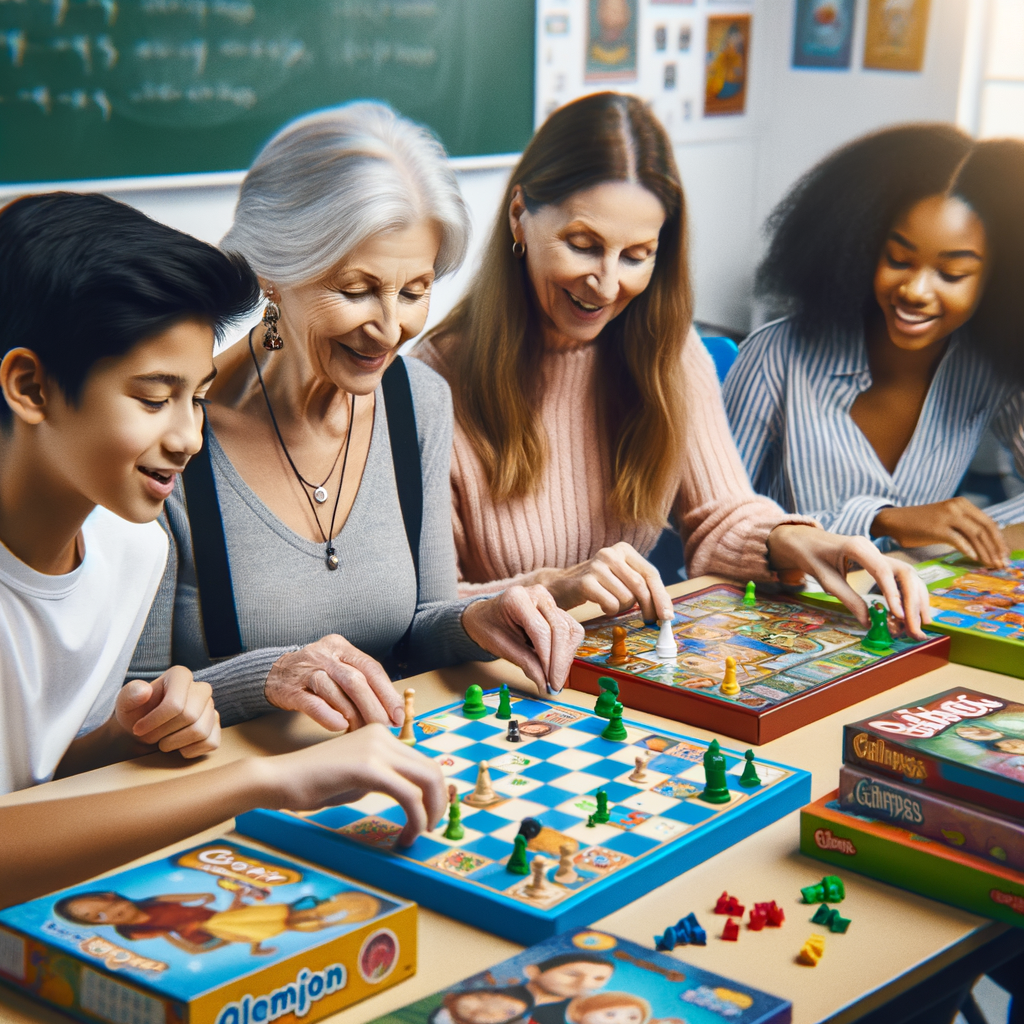Introduction to Board Games in Education
Welcome to the fascinating world of board games in education. This introductory section will provide you with a comprehensive overview of the concept and the historical context of board games and learning.
- Overview of the Concept
Board games have been an integral part of human culture for thousands of years. Today, they are not just a source of entertainment, but also a powerful tool for learning. Board games in education is a concept that combines the fun of playing games with the process of learning. These games are designed to help students develop a variety of skills such as critical thinking, problem-solving, and teamwork. They can be used in a variety of educational settings, from classrooms to after-school programs, and are suitable for learners of all ages.
- Historical Context of Board Games and Learning
The use of board games for learning dates back to ancient times. For instance, the game of Senet, played in ancient Egypt over 5000 years ago, was used to teach social and moral lessons. In the Middle Ages, the game of chess was used to teach strategy and critical thinking. In the 19th century, educational board games became popular in Europe and America, with games designed to teach geography, history, and math. Today, the use of board games in education is a growing trend, with a wide variety of games available that cater to different subjects and learning objectives.
As we delve deeper into this topic, we will explore the intersection of board games and education, different types of educational board games, and how learning occurs through board games. We will also share some interesting case studies and practical tips for teaching with board games. So, let’s embark on this exciting journey of learning through play!
The Intersection of Board Games and Education
 Board games have been a source of entertainment for centuries. However, in recent years, educators have discovered the potential of board games as a learning tool. In this section, we will explore the intersection of board games and education.
Board games have been a source of entertainment for centuries. However, in recent years, educators have discovered the potential of board games as a learning tool. In this section, we will explore the intersection of board games and education.
- Exploring the connection between board games and learning
Board games can be much more than just a fun pastime. They can also be a powerful educational tool. When children play board games, they are not only engaged in a fun activity, but they are also learning valuable skills. For instance, board games can help children develop critical thinking skills, improve their memory and concentration, and learn how to strategize and make decisions. Moreover, board games can teach children about different topics, such as history, geography, and science. Wikipedia provides an extensive list of educational games that can be used for learning purposes.
- Understanding the educational potential of board games
The educational potential of board games is vast. They can be used to teach a wide range of subjects and skills. For example, games like “Ticket to Ride” can teach geography, while games like “Scrabble” can improve vocabulary and spelling. Board games can also help children develop social skills, such as taking turns, sharing, and cooperating with others. Furthermore, board games can be used to teach children about rules and fairness. In a study conducted by University of California, Berkeley, it was found that children who regularly played board games showed significant improvement in their math skills.
In conclusion, board games and education intersect in many ways. By incorporating board games into the classroom, educators can provide a fun and engaging way for children to learn. So, the next time you see a board game, remember that it is not just a toy, but a powerful educational tool.
Types of Educational Board Games
Board Games for Young Learners
Board games are not just for fun, they can also be a powerful learning tool, especially for young learners. Let’s explore some examples of board games that are particularly beneficial for early education and the advantages they offer.
Examples of board games for early education
There are many board games designed to help young learners develop essential skills. Here are a few examples:
- Candy Land: This classic game teaches color recognition and matching skills.
- Chutes and Ladders: This game helps children understand number sequences and basic counting.
- Zingo!: This game is great for developing vocabulary and reading skills.
- Benefits of using board games in early education
Board games can provide numerous benefits for young learners, including:
- Improved Cognitive Skills: Board games can help children improve their memory and problem-solving skills.
- Social Skills Development: Playing board games can help children learn how to share, take turns, and communicate effectively.
- Enhanced Academic Skills: Many board games are designed to reinforce skills such as reading, math, and science.
In conclusion, board games can be a fun and effective way to enhance learning for young children. By incorporating these games into early education, we can help children develop important skills while they play.
Board Games for Teenagers
Teenagers are at a crucial stage in their development where they are learning to navigate complex social interactions and developing critical thinking skills. Board games can play a significant role in this process. Let’s explore some examples of board games suitable for secondary education and the benefits they offer.
Examples of board games for secondary education
There are numerous board games that can be beneficial for teenagers in secondary education. Here are a few examples:
- Catan: This game encourages strategic thinking and negotiation skills.
- Ticket to Ride: This game helps to enhance geography knowledge and planning skills.
- Scrabble: A classic game that enhances vocabulary and spelling skills.
- Benefits of using board games in secondary education
Integrating board games into secondary education can offer several benefits:
- Enhances Learning: Board games can make learning fun and engaging, which can help to improve knowledge retention.
- Develops Social Skills: Playing board games can help teenagers to develop important social skills, such as communication, negotiation, and teamwork.
- Improves Critical Thinking: Many board games require strategic thinking and problem-solving, which can help to improve critical thinking skills.
In conclusion, board games can be a powerful tool in secondary education, offering a fun and engaging way to enhance learning, develop social skills, and improve critical thinking. So, why not try integrating some of these games into your teaching methods?
Board Games for Adults
Board games are not just for kids and teenagers. They can also be a fun and effective tool for adult education. Let’s explore some examples and benefits of using board games in adult education.
Examples of board games for adult education
There are numerous board games that can be used in adult education to make learning more engaging and enjoyable. Here are a few examples:
- Scrabble: This classic word game can help adults improve their vocabulary and spelling skills. Learn more about Scrabble here.
- Monopoly: Monopoly is an excellent game for teaching adults about money management, property investment, and strategic thinking. Learn more about Monopoly here.
- Trivial Pursuit: This game can be used to enhance general knowledge and critical thinking skills. Learn more about Trivial Pursuit here.
Benefits of using board games in adult education
Integrating board games into adult education can offer numerous benefits. Here are a few:
- Engagement: Board games can make learning more fun and interactive, which can increase student engagement.
- Retention: The hands-on nature of board games can help adults better retain the information they learn.
- Social Skills: Playing board games can help adults improve their communication and teamwork skills.
- Critical Thinking: Many board games require strategic thinking and problem-solving, which can enhance these important skills.
In conclusion, board games can be a valuable tool in adult education, offering a fun and engaging way to learn new skills and knowledge. So why not try incorporating some board games into your next adult education session?
Learning through Board Games
Board games are not just about fun and entertainment. They are also powerful tools for learning. Let’s explore how these games facilitate learning and the key skills they help to develop.
- How board games facilitate learning
Board games are a great way to engage children in a learning process that is fun and interactive. They stimulate the brain, encourage strategic thinking, and promote communication and social skills. The rules of the game provide a structure that requires players to follow instructions and make decisions. This can be particularly beneficial for children who struggle with attention and focus.
For example, a game like Chess can help children improve their problem-solving skills. They have to plan their moves carefully, anticipate their opponent’s strategy, and adapt their own strategy in response. This kind of strategic thinking can be applied in many real-life situations, from solving math problems to making decisions about how to spend their time.
- Key skills developed through board games
Playing board games can help children develop a range of key skills. Here are a few examples:
| Skill | How Board Games Help |
|---|---|
| Critical Thinking | Games like Chess or Checkers require players to think several moves ahead and make strategic decisions. |
| Problem Solving | In games like Clue, players have to use deduction and logic to solve a mystery. |
| Social Skills | Many board games require cooperation and communication between players, which can help children develop their social skills. |
| Persistence | Board games often involve setbacks and challenges, which can teach children the value of persistence and resilience. |
In conclusion, board games are a valuable tool for learning. They provide a fun and engaging way to develop key skills and can be a great addition to any educational setting.
Case Studies: Board Games and Learning
Let’s delve into some real-life examples of how board games have been effectively used in educational settings. Our first case study focuses on the use of board games in a classroom setting.
Case Study 1: Using Board Games in a Classroom Setting
In this case study, we will explore how a middle school teacher incorporated board games into her teaching methodology to enhance student engagement and learning.
- Overview of the case study
Ms. Johnson, a middle school teacher, decided to incorporate board games into her teaching methodology. She used a variety of board games, including strategy games, trivia games, and puzzle games, to teach various subjects such as math, science, and social studies. The games were used as a supplement to traditional teaching methods, providing a fun and interactive way for students to learn and apply concepts.
- Key takeaways from the case study
Through the use of board games, Ms. Johnson observed a significant increase in student engagement and participation. Students were more enthusiastic about learning and were able to grasp and retain concepts more effectively. The games also fostered teamwork and improved problem-solving skills among students. This case study demonstrates the potential of board games as effective educational tools in a classroom setting.
In conclusion, this case study illustrates the potential of board games as a powerful tool in education. They can make learning more engaging and fun, while also fostering important skills such as problem-solving and teamwork. As we continue to explore the intersection of board games and education, it’s clear that the possibilities are endless.
Case Study 2: Board Games as Educational Tools at Home
Board games are not just for fun and entertainment. They can also be powerful educational tools, especially when used at home. This case study explores how board games can be used to enhance learning in a home setting.
- Overview of the case study
In this case study, a family with two children aged 8 and 10 decided to incorporate board games into their home learning routine. The games chosen were specifically designed to develop skills such as critical thinking, problem-solving, and teamwork. The family played these games regularly for six months, and the children’s progress was monitored and evaluated.
- Key takeaways from the case study
After six months, the family reported several positive outcomes. The children showed significant improvement in their problem-solving and critical thinking skills. They also demonstrated better teamwork and communication abilities. Moreover, the children were more engaged and motivated in their learning. This case study shows that board games can be effective educational tools when used properly at home.
Board games can be a fun and engaging way to enhance learning at home. They can help children develop important skills and foster a love for learning. As this case study shows, board games can be a valuable addition to any home learning routine.
For more information on how board games can be used as educational tools, you can visit this Wikipedia page.
Teaching with Board Games: Practical Tips
Board games can be a powerful tool in the classroom, but they need to be used correctly to have the desired impact. Here are some practical tips to help you get the most out of using board games in your teaching.
- Choosing the right board game
Not all board games are created equal, especially when it comes to their educational value. When choosing a board game for your classroom, consider the age and skill level of your students, as well as the learning objectives you want to achieve. For example, a game like Scrabble can be great for improving vocabulary and spelling skills, while a game like Settlers of Catan can help students develop strategic thinking and negotiation skills.
- Integrating board games into a lesson plan
Board games should not be an afterthought or a time-filler, but rather an integral part of your lesson plan. Before introducing a game, explain to your students how it relates to what they are learning. After playing, facilitate a discussion about what they learned from the game and how it applies to the lesson. This will help them see the value in the activity and take it more seriously.
- Assessing learning outcomes from board games
Just like any other teaching tool, it’s important to assess the effectiveness of board games in achieving your learning objectives. This can be done through observation during play, discussions after the game, or even formal assessments. For example, if you’re using Scrabble to improve vocabulary, you might give a spelling test before and after a series of games to measure improvement.
In conclusion, board games can be a fun and effective way to enhance learning in the classroom. By choosing the right games, integrating them into your lesson plans, and assessing their effectiveness, you can ensure that your students get the most out of this unique teaching tool.
Conclusion: The Future of Board Games for Learning
As we wrap up our discussion on the role of board games in education, let’s look at where we’re headed. We’ve seen how board games can be a powerful tool for learning, and how they’re currently being used in classrooms around the world. Now, let’s explore the current trends in educational board games and make some predictions about the future.
- Current trends in educational board games
Today, educational board games are becoming more and more popular in schools and homes. They are being used to teach a wide range of subjects, from math and science to history and language arts. These games are designed to be fun and engaging, making learning an enjoyable experience for students. According to a Wikipedia article, educational games can help improve students’ motivation and engagement, and can also enhance their problem-solving and critical thinking skills.
- Predictions for the future of board games in education
Looking ahead, we can expect to see even more innovative and effective educational board games being developed. As technology continues to advance, we might see more digital board games that can be played on tablets or computers. These games could offer interactive and immersive learning experiences, making education even more engaging and exciting for students. Furthermore, as more research is conducted on the benefits of educational games, we can expect to see more schools incorporating these games into their curriculums.
In conclusion, the future of board games in education looks bright. With their ability to make learning fun and engaging, board games are set to play an even bigger role in education in the coming years. So, whether you’re a teacher, a parent, or a student, it’s time to start embracing the power of board games for learning.



